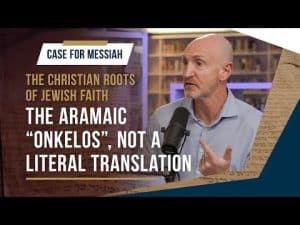Paul assures us in Romans 11:26 that, “All Israel will be saved”. That's quite a statement! What does he mean, exactly? Who is included in “All Israel”? There are four main views regarding the identity of “all Israel” in Romans 11:26. We favor the latter view, and will explain why, by looking carefully at the meaning and context of the words that Paul uses in Romans 11.
The four views are that “all Israel” means:
- The Jews – Every Jew ever lived is “all Israel” and therefore automatically saved.
Although rarely believed in today, according to this view, any Jew ever lived (past, present and future) who considered himself as a Jew according to the Law of Moses and the traditions of the Rabbis, is saved. This view is not only far-fetched, but also stands in complete contradiction to what Jesus thought about God and Himself. - The church – Jews and Gentiles deemed to have been saved throughout all generations.
Otherwise known as “replacement theology”, this view equates “all Israel” to the church, as “the Israel of God”. However, this view becomes hard to maintain in the light of Romans 11:28, if the use of the pronoun “they” is followed through to its logical conclusion. - The chosen remnant – all Jewish believers within ethnic Israel that have been saved throughout history.
This notion indicates that the hardened stance of the Israelite nation is partial and thus a remnant portion among the Jews will continue to face God’s salvation until the end of the modern times. - Ethnic Israel – the people of Israel will receive salvation at the end of days.
This interpretation asserts that the existing hardening of Israel (albeit partial) will continue till the culmination of this age, at which point, they will turn to Christ at that time and accept His salvation in accordance God’s faithfulness to fulfill his covenantal promises made to Abraham, Isaac, and Jacob. Despite the majority of Israel currently still being in rebellion, God will not forget His people, and will pour His Spirit on Israel at a specific point in time, in agreement with the covenantal promises. At that specific time, the people of Israel living in those days will accept the Messiah.
Does it mean every Jew who ever lived?
In his book “Post-missionary Messianic Judaism”, American Messianic Jewish believer, Dr. Mark Kinzer, asks what we should make of the past 2,000 years of Jewish traditions. He concludes that Israel’s “no” to Yeshua (Jesus) is actually a “hidden participation in the obedience of Israel’s Messiah”[1]. According to Kinzer, although Israel has rejected Yeshua, He “continues to live among them—though in a hidden, obscure fashion”. What Kinzer is really saying is that Jewish tradition (that includes the rejection of the Messiah) is God’s wish for the Jewish people at this time: “a divinely sanctioned religious tradition appointed for the purpose of preserving the Jewish people”. This view is based on the idea that when some Jews answered Pilate “All the people answered, “His blood is on us and on our children!” (Matthew 27:25), God considered Jesus’ blood to covered them and their sins. While I have never met with Dr. Kinzer, I have no doubt that he dearly love his own Jewish people. The problem however is that he loves the the Jews so much, that his love for them is in competition with the gospel, and contradicts what Yeshua himself taught about salvation.
Judaism’s rejection of Jesus is based on Judaism’s rejection of Moses, and the prophets. Dead traditions cannot give life nor change our heart for the better, only faith in Messiah can. The outcome of religious traditions that I’ve encountered so far is mainly characterized by pride, legalism and self-justification – nothing that can “save” you.
Did Paul mean the Church?
Herman Ridderbos maintains that, “The church … as the people of the New Covenant has taken the place of Israel, and national Israel is nothing other than the empty shell from which the pearl has been removed and which has lost its function in the history of redemption.” [2] Similarly, Waltke maintains that the church and the New Covenant have permanently supplanted the Israelite nationality together with her law.” [3]
By their rejection of the gospel and the Jesus, has nation of Israel eternally lost her status? Or does the nation of Israel have a hopeful future concerning God’s liberating plan of redemption? Will they “all” be saved? And who are “they”?
The meaning of Paul’s statement in 11:26 can be better appreciated by taking a closer look at some of the words used in the surrounding context. For example, Paul’s use of the words mystrion (mystery) and achris (until) in verse 25 kai houtos (and thus) at the start of verse 26, and they in verse 28.
Rom 11:28 has a particular importance because it bears directly to the identity of “all Israel”. Paul asserts that “all Israel” are viewed as enemies from the gospel point of view. However, from God’s point of view, they are much loved because for the sake of their forefathers. Paul uses this verse to lay ground and make strong prediction concerning the salvation nature of “all Israel.” Despite verse 28 being asyndeton and lacking a proper connection to with the aforementioned content, there is a forged implication used to supplement the subjects touched in verse 28. The use of “they” in verse 27 is not used in its original context and thus need to be supplemented using “them” in the same verse. It seems to be referring to Jacob in verse 26, which then refers back to “all Israel” as evident in verse 26. The importance of this concept is seen in the fact that verse 28 describes the same group of individuals similar to the one denoted by the term “all Israel” in verse 26. In other words, Paul has helped to establish an identity of “all Israel” through his words in verse 28 and his description in verse 26.
Paul refers to the subject or the people by describing them as “enemies for the sake of you.” Due to the fact that Paul continuously uses the pronoun “you” to reference the Gentiles, the noun “enemies” must be referring to the ethnic Jews. Verse 28 has Paul summing up the main theme by claiming that the non-believers who made up ethnic Israel were perceived as God’s enemies. This, according to Paul, was for the betterment of the Gentiles. Simply put, from the gospel’s point of view, “they” refers to the ethnic Jews while “you” refers to the Gentiles.
The other reason that presents problems for “the church” view is when analysing verse 28 is that the two clauses used in the whole verse are difficult to use when describing the church. The table below shows the parallel comparison of the two clauses in relation to verse 28:
| kata men to euangelion | echthroi | di’ hymas |
| “as per the gospel” | “enemies” |
“for your sake” |
| kata de t‘n eklog‘n | agapat‘toi | dia tous pateras |
| “as per election” | “beloved” | “due to the fathers” |
The two clauses above reveal two distinct revelations; individuals categorized as “all Israel” as defined in verse 26 are treated as enemies of God while on the other hand, God still show some love for them. They are treated as enemies from the viewpoint that they have rejected God’s gospel as evident for the case of the Gentiles. However, those same individuals are beloved by God since he has chosen to elect them as he promised to the fathers. This leads to the description of the concept of the “dual status” of Israel primarily because it holds ground for two contradicting views of individuals, which at the same time can be interpreted to be true.
In simple terms, it is quite impossible for the two clauses to be referring to the church. How could we define the Body of Christ as “God’s enemies”?
Yet in verse 28 Paul asserts that this group of individuals are seen as enemies from God from the Gospel’s standpoint. This is specifically due to the fact that the gospel and those who believe in it are not deemed God’s enemies. Romans 11:28 disqualifies interpretation of the Church as Israel.
The chosen remnant?
“The chosen remnant” view is that “all Israel” refers to the believing remnant of the Jewish community. Supporters of this view will insist that verse 28 offers a description of individuals whom God regarded as enemies but have now received salvation and God’s love. Similarly, as noted by Hendriksen, the pronoun “these” used to qualify “enemies” and the “beloved ones” apparently points to the same group of people, who happen to be the elect. “These people were initially unreceptive of the gospel but through magnificent exhibition of God’s mercy, they were able to be beloved.”[4]
The argument is that he first clause of 11:28 refers to the elect in their unsaved state, while the second describes their status after receiving God’s salvation. There is an obvious difficulty with Romans 11:28 and the remnant view, based on these two clauses. They offer two distinct interpretations of “all Israel,” which interestingly appear to be true at the same time. This is supported by Paul’s use of the conjunction “on one hand” and “on the other hand”: They are described as enemies and beloved simultaneously, and not first enemies and only becoming the beloved after some time.”
If Paul had intended to refer to people who had initially been enemies but who have now become beloved (and not enemies any longer), he would not have used the correlative conjunction “on the one hand” and “but on the other hand”, but rather “formerly” and “but now.” Paul’s writing often uses contrasting elements to highlight the differences between the state of affairs between the pre-conversion and post-conversion state. [5]
In Rom 11:28, Paul use the correlative conjunctions to illustrate the existence of simultaneous state between the pre-converted past and the post-converted present state of affairs. It is thus difficult to use Romans 11:28 to denote individuals who were enemies in the pre-conversion past but are now beloved in the post-conversion present. Consequently, “the remnant” view is not credible enough to offer a good interpretation of Romans 11:26.
The ethnic state of Israel
The fourth view maintains that “all Israel” actually means the whole ethnic state of Israel. This interpretation asserts that the existing hardening of Israel (albeit partial) will continue till the culmination of this age, and that the whole Israelite ethnic nation will ultimately turn to Christ and accept His salvation.
Proponents of this view argue that the salvation of the Israelites ethnic nation has its root in God’s faithfulness to fulfill his covenantal promises made to Abraham, Isaac, and Jacob. Despite the majority of Israel being in rebellion, God will not forget His people. Instead, God will pour His Spirit on Israel at a specific point in time, in agreement with the covenantal promises. At that time, all of Israel will accept the Messiah en masse.
This my own view. The “ethnic Israel” view offers a perfectly fitting interpretation of the dual status of “all Israel” in sharp contrast to those offered by other views. Romans 11:28 portrays “all Israel” as the whole nation of Israel. The first half of verse 28a, 28b, and 29 provide ample support for this statement.
Verse 28a
Based on the “ethnic Israel” view, the current state of the nation of Israel is that of a hardened one at least as per Romans 11:25. The majority of the Israelites do not demonstrate a liking for the Messiah, as described in verse 11 with the use of the terms “their transgression” and in verse 15 as “their rejection.” In the first clause of Romans 11:28 Paul offers a distinct description of the hardened state of the nation of Israel by denoting the nation as being the enemies of God. These are people who stand in enmity with God and among whom God harbours much displeasure. The use of the preposition kata is used to designate the accepted way in which judgement will be accorded. It offers a definition of a rule upon which God’s have managed to establish a relationship with the nation of Israel. The nation of Israel are seen as God’s enemies when viewed from the perspective of their rejection of the gospel.
In the first clause, Paul reiterates the issue of enmity by writing that the people are enemies for the sake of “you.” The believing portion of the gentile community is described using the second-person pronoun. Here, Paul implies that the by rejecting the gospel, the nation of Israel was working towards the benefit of the Gentiles who ended up receiving salvation – much to their advantage. In the present context, “all Israel” still equates to God’s enemies although that rejection has resulted in many Gentiles finding salvation. The dual status in the first half of verse 28 is reiterated by the statement that the Jewish non-believers that comprise the nation of Israel are perceived as enemies as per the gospel and also for the Gentiles’ sake.
Verse 28b
Paul writes that non-believing Israel are God’s enemies yet that they are also beloved at the same time. First, Paul writes that the nation of Israel are beloved by God “according to election”. The preposition kata is used in a similar manner to the first clause to assert the normative form of the way in which judgement will be accorded. “The same is used to arrive at a definition of the rule of determining God’s relationship with the Israelites.” The term “according to election” should thus be interpreted to denote the notion that even though these people are recognized as enemies at least in regards to the gospel, they are still beloved from the perspective of God’s irrevocable choice. This is shown by God’s decision to elect the nation of Israel to be his solely appointed nation. Murray goes on to add that, the term “beloved” denotes “that God has not ignored or forsaken his good relationship with the nation of Israel because he views them as his own people and wants to maintain the covenants made with the forefathers. Even though the present nation of Israel is hardened, God still sees them as the elect and beloved nation. The second prepositional phrase used Paul to emphasize this point is illustrated though the use of the clause “because of the fathers”… The term “fathers” refers to the main patriarchs of Israel and include Abraham, Isaac, and Jacob. It also has a special reference to the covenant promises that God made to them. Morris further writes that Paul is seen to make more appeal to the covenant made between God and Abraham as well as the one made to his descendants throughout their lifetimes.[6] The importance of the second clause is that when perceived from God’s perspective of electing the nation of Israel, “all Israel” is beloved by God primarily because of his desire to fulfil the covenant made to Abraham, Isaac, and Jacob.
Verse 29
Paul uses verse 29 to assert and provide support for the argument that God still loves the nation of Israel and still views it as his chosen nation. In verse 28b, Paul asserts this by writing that the gifts and calling made by God cannot revoked. Despite failing to exclusively define the notion of the “gift” in this context, there is the likelihood that the usage of the word is meant to provide a summary of the good things and privileges accorded to the nation of Israel as indicated in Romans 9:4–5. However, the term “calling” is clearly defined as the process of God’s choosing to elect the beloved Jews. Simply put, it refers to the act of God calling the nation of Israel and electing them to be his own people whom he would stand with, thus fulfilling his promises to the fathers.”
Paul’s focus in verse 29 is upon the term “irrevocable”, which is used to describe something or a situation in which it is impossible to revert or go back to.[7] It is difficult to know whether readers of Paul’s scriptures would be in a position to ascertain whether God still considers the nation of Israel as beloved, especially when viewed from God’s perspective of them being his chosen people. The gifts and the calling to the nation of Israel are irrevocable based on the fact that God does not backtrack on his promises. Moo goes on to add that Paul had a reason for emphasizing the term “irrevocable “at the beginning of the verse indicating that the word of God “has not failed.” God still has a plan for the nation of Israel due to His faithful nature.” [8] Put simply, while Israel rejected God’s Messiah, God has not backtracked on the promises made to the fathers, and equally, those promises have not been annulled by Israel's lack of faith.
Paul’s assertion of Israel’s dual status in v. 28 succinctly summarizes the dilemma that drives the whole argument of these chapters: the Israel now at enmity with God because of the gospel is nevertheless the Israel to whom God has made irrevocable promises of blessing. In broad terms, as 9:30–10:21 has elaborated the former, negative side of this dilemma, so 9:6b–29 and 11:1–27 have explained the second, positive side. [9]
In a similar context, Murray reiterates that the people of Israel are perceived as both being “enemies” and “beloved” at the same moment – enemies in correlation to the gospel while simultaneously beloved in correlation to their election. This contrasting element indicates that by rejecting the gospel, the nation of Israel was put to the side while the gospel was delivered to the Gentiles. Nevertheless, by virtue of being elected and in accordance with their connection with the patriarchs, they are beloved. The term “beloved” thereby implies that God has not relented but remains faithful in his relationship with the nation of Israel, and still regards them as his chosen people, fully committed to the fulfilment of the covenants made with the fathers. God still shows dedication and peculiar relationship with the nation of Israel despite them being unfaithful to him. This relationship is destined to be illustrated and justified in the eventual restoration (see Rom 11 verses 12, 15, 26).
Romans 11:28 provides a description of “all Israel” that indicates the unbelieving nature of the nation of Israel. It also points out the entire nation of Israel will one day be restored. The refusal of the nation of Israel to accept the gospel of the Messiah did not prevent God from honouring the specific promises he had made with the Fathers. Using Bloesch’s words, God’s rejection of the nation of Israel was only provisional implying that the entire nation of Israel would be saved. [10]
Conclusion
The analysis of Romans 11:28 makes it clear that the dual status of “all Israel” is well interpreted using the view that “all Israel” is the ethnic state of Israel. This is because the interpretation in this view sufficiently envisages a situation whereby the two clauses of Romans 11:28 can be said to be simultaneously true in the present state concerning the “all Israel.” In the same scenario, the unbelieving Israelite nation is perceived on the one hand as the enemy of God, while on the other, still very much beloved. At the end of it all, God has not and will not abandon His chosen nation, Israel.
Eitan Bar
Notes
[1] Mark S. Kinzer, “Postmissionary Messianic Judaism: Redefining Christian Engagement with the Jewish People” (Brazos Press, 2005) p.225-228
[2] Herman Ridderbos, “Paul: An Outline of His Theology” (Grand Rapids: Eerdmans, 1975) p.354-355
[3] Bruce K. Waltke, “Kingdom Promises as Spiritual” (Westchester, Ill.: Crossway, 1988) p.274
[4] Karl Barth, “The Epistle to the Romans” (Oxford University Press, 1968) p.418-419
[5] For instance: Rom 11:30, Gal 1:2, Eph 5:8, Col 1:21-22, 3:7-8, Philemon 10-11. In other instances, Paul, utilizes a different combinational technique to illustrate the temporary contrast between the pre-conversion and post-conversion state of affairs. For instance in Romans 7:5-6, he utilises the active indicative pronoun “we were” and combined with “but now.” He also demonstrates the same element of establishing temporal contrast by using the combination of “at that time” and “but now” as evident in Galatians 4:8-9: “However, at that time …. But now….?”
[6] Morris, “The Epistle to the Romans”, p.423
[7] Walter Bauer, Frederick W. Danker, William F. Arndt, and F. Wilbur Gingrich, “A Greek-English Lexicon of the New Testament and Other Early Christian Literature,” 3rd ed (Chicago: University of Chicago, 2000) p.53
[8] Douglas J. Moo, “The Epistle to the Romans (The New International Commentary on the New Testament)”, (Eerdmans, 1996) p.732
[9] ibid p.729-730














